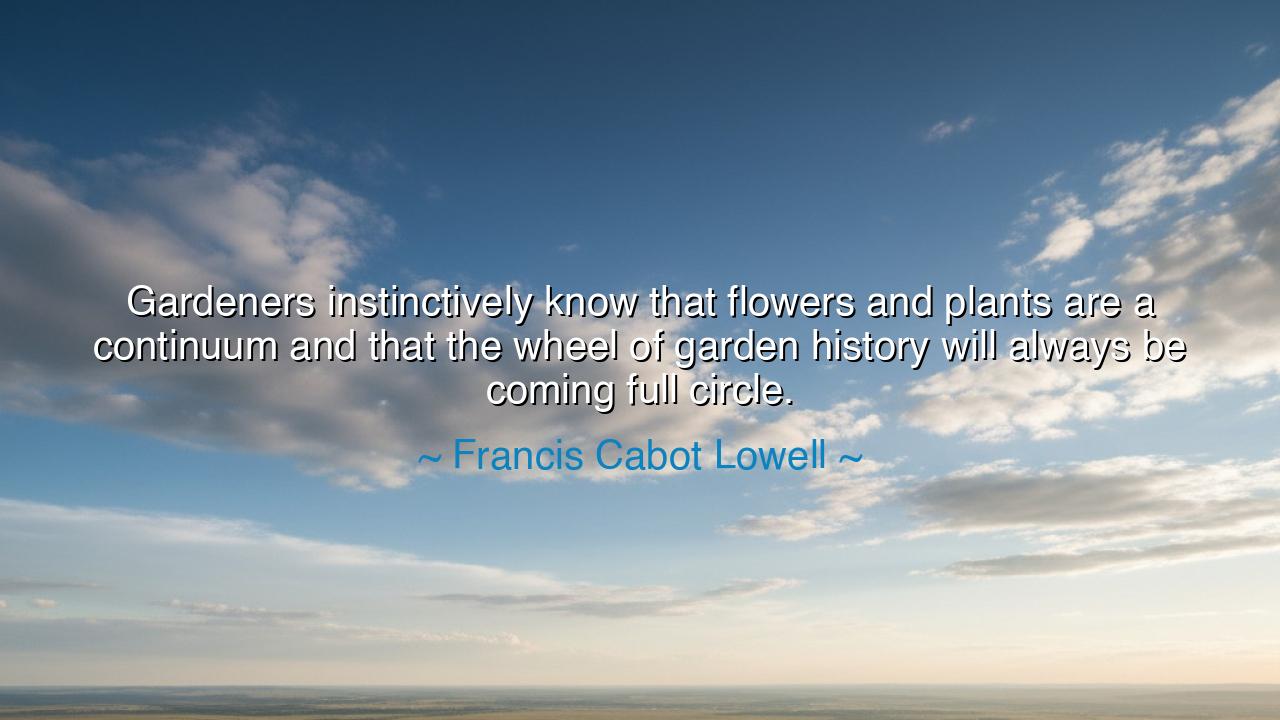
Gardeners instinctively know that flowers and plants are a
Gardeners instinctively know that flowers and plants are a continuum and that the wheel of garden history will always be coming full circle.






The horticulturist and visionary Francis Cabot Lowell once reflected: “Gardeners instinctively know that flowers and plants are a continuum and that the wheel of garden history will always be coming full circle.” These words are not merely about the tending of soil and seed—they are about life itself, the great rhythm of creation and return. Lowell, who devoted his life to the preservation of gardens and landscapes, here speaks of an eternal truth: that nature, like the spirit, moves not in straight lines but in cycles. What blooms today will wither, and what dies will rise again in another form. In the garden, the wise see not endings, but continuity.
When Lowell says that “flowers and plants are a continuum,” he is revealing the unity that underlies all living things. A gardener understands that no blossom stands alone. Each seed is the heir to generations past—the wildflowers that grew in forgotten fields, the ancient trees whose roots fed the soil, the patient hands that cultivated them. In this endless chain, every plant carries both memory and promise. To tend a garden is to participate in the great lineage of life itself, to become a link in the eternal weaving of growth, decay, and renewal.
The wheel of garden history, as Lowell calls it, turns like the wheel of time. Fashions in horticulture change—what was once prized becomes neglected, and what was forgotten finds new life. In one century, the world celebrates the order of manicured hedges; in another, it rediscovers the wild grace of the meadow. Yet beneath these shifting aesthetics lies the same yearning that has always moved the gardener: the desire to co-create with nature, to bring forth beauty through harmony rather than control. The gardener, more than any other, knows that time is not an enemy but a companion. What one plants today may not bloom in one’s lifetime, yet still the hand sows, for the joy of those who will come after.
History offers proof of this eternal turning. The gardens of Babylon, counted among the wonders of the ancient world, rose as terraces of paradise amid desert sands. Centuries later, in the monasteries of medieval Europe, monks cultivated herbs and flowers with reverence, keeping alive the knowledge of healing and cultivation through the dark ages. Then came the Renaissance, when gardens became reflections of art and philosophy, symbols of man’s rediscovered harmony with the cosmos. Each age thought itself an innovator, yet each in truth was a rediscovery—a returning to what the ancients already knew: that to nurture the earth is to nurture the soul.
Lowell himself embodied this timeless reverence. A modern gardener and philanthropist, he founded the Garden Conservancy to preserve historic gardens, believing that they held the memory of civilizations in their soil. Through his work, forgotten landscapes bloomed anew, and with them bloomed the old wisdom that beauty is never lost—it merely waits beneath the surface for a new season to awaken it. His quote is thus both observation and prophecy: that just as flowers return after winter, so too does human devotion to nature, cycling through neglect and rediscovery, forever coming full circle.
But this circle is not only the story of gardens—it is the story of the human heart. Each of us has seasons of bloom and barrenness, times of sowing and times of rest. We, too, are part of the continuum. Our joys, our labors, our failures—they enrich the soil of existence for those who will follow. To live wisely is to accept this rhythm, to see death not as an end, but as transformation. The gardener teaches us that patience is power, that creation requires surrender, and that all things find renewal when met with care and time.
So, let this be the lesson: live as a gardener of the soul. Plant kindness knowing it may bloom beyond your sight. Tend your relationships as you would your roses—with devotion, with pruning, with faith in their return. When loss comes, remember the turning of the wheel—that every winter is only the prelude to spring. For as Francis Cabot Lowell reminds us, all beauty is part of a greater continuum, and every circle—of gardens, of life, of history—returns at last to the hands that love the earth.
Thus, my child, honor the cycle. Do not despair at endings, nor cling to blossoms past their time. Instead, trust the unseen rhythm that sustains all things. For the gardener’s wisdom is the world’s oldest truth: that what we care for with patience will live again, and that every act of tending—be it of soil, art, or heart—is a way of turning the wheel of life once more toward light.






AAdministratorAdministrator
Welcome, honored guests. Please leave a comment, we will respond soon